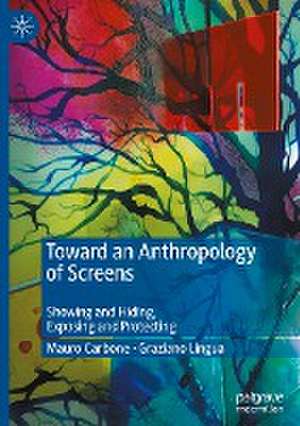Toward an Anthropology of Screens: Showing and Hiding, Exposing and Protecting
Autor Mauro Carbone, Graziano Linguaen Limba Engleză Hardback – 5 oct 2023
Preț: 726.23 lei
Preț vechi: 885.64 lei
-18% Nou
Puncte Express: 1089
Preț estimativ în valută:
138.97€ • 148.60$ • 115.87£
138.97€ • 148.60$ • 115.87£
Carte tipărită la comandă
Livrare economică 17 aprilie-01 mai
Preluare comenzi: 021 569.72.76
Specificații
ISBN-13: 9783031308154
ISBN-10: 3031308158
Ilustrații: XIII, 194 p. 6 illus., 3 illus. in color.
Dimensiuni: 148 x 210 mm
Greutate: 0.4 kg
Ediția:1st ed. 2023
Editura: Springer Nature Switzerland
Colecția Palgrave Macmillan
Locul publicării:Cham, Switzerland
ISBN-10: 3031308158
Ilustrații: XIII, 194 p. 6 illus., 3 illus. in color.
Dimensiuni: 148 x 210 mm
Greutate: 0.4 kg
Ediția:1st ed. 2023
Editura: Springer Nature Switzerland
Colecția Palgrave Macmillan
Locul publicării:Cham, Switzerland
Cuprins
1. Introduction.- 2. On the Powers of the Arche-screen.- 3. Screens as Prostheses of Our Bodies.- 4. Images and Words.- 5. The “Transparency 2.0” Ideology.- 6.Screens’r’us - From Bodies with Prostheses to Bodies As “Quasi-Prostheses”?.- 7. Conclusion.
Notă biografică
Mauro Carbone is Professor Emeritus of Aesthetics at the Lyon-3 University, France. A leading scholar in Merleau-Ponty, Screen and Visual Studies, he directs the International Research Group “Living Among and Through Screens.” His most recent book on this topic is Philosophy-Screens: From Cinema to Digital Revolution (2019).
Graziano Lingua is Full Professor of Moral Philosophy, Head of the Philosophy and Educational Sciences Department at the University of Turin, Italy, and Co-Director of the Département Humanisme numérique at the Collège des Bernardins, Paris, France. His research is focused on the philosophy of images and public ethics.
Graziano Lingua is Full Professor of Moral Philosophy, Head of the Philosophy and Educational Sciences Department at the University of Turin, Italy, and Co-Director of the Département Humanisme numérique at the Collège des Bernardins, Paris, France. His research is focused on the philosophy of images and public ethics.
Caracteristici
Focuses on screen experiences from a wide anthropological perspective usually neglected in philosophy and visual studies Criticizes in detail the exclusive focus on images that presently dominates the common understanding of screens Shows how wearable technologies, rather than replacing screens, temporarily use our body organs as connected screens
